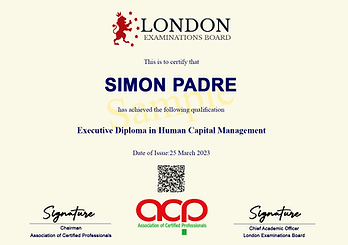PROGRAMME AIMS
This Executive Diploma in Human Capital Management is designed to Understand the role HR currently plays in organizations and be able to identify future trends. Understand the issues relating to acquire the knowledge and skills required for effective manpower planning, and be able to undertake critical tasks and apply strategies for effective performance appraisals and ensure good employee retention. Those who are keen to further their education can progress on to either the Higher Diploma in Human Capital Management or gain entry and acceptance into Year 2 of a Bachelor degree.
PROGRAMME STRUCTURE
The Executive Diploma in Human Capital Management comprises of three modules. Executive Diploma in Human Capital Management is a professional diploma delivered in a manner that gives you the flexibility to learn at a time and place that suits your personal and work life. You can embark immediately on an Executive Diploma in Human Capital Management knowing you can fit it into your schedule.
3 core modules 60 credits
- Manpower Planning – 20 Credits
- Employee Retention – 20 Credits
- Performance Appraisal – 20 Credits
DELIVERY MODE
Mode A: Blended Learning mode
Available at selected Approved Learning Centres where classes are held plus learners are given a complete set of learning materials to facilitate independent study which can be accessed through our designated Learning Portal.
For each module we recommend that Approved Learning Centres provide between 6 and 12 hours of lectures/tutorials and that you spend at least 12 hours learning online.
Mode B: Fully Online mode
Learners are given a complete set of learning materials to facilitate independent study which can be accessed through our designated Learning Portal. For each module, we recommend at least 24 hours of online learning.
ADMISSION CRITERIA
An applicant may be admitted on the basis of evidence to suggest that he or she will be able to fulfill and benefit from the objectives of the programme and achieve the standard required for the award.
Summary of Entry Requirements
No prior knowledge is required. Applicants should normally be at least 16 years old and preferably with the following:
- Level 3 (QCF/RQF) Certificate;
- 4 GCSEs at grade C or above; or
- Working adults.
Advanced Standing / Exemptions / Credits Transfer (APL)
Consideration for the above for learners admitted onto the programme may be considered either at the beginning of a programme, or beyond the beginning of a programme, through an assessment of that learner’s prior learning, whether certificated or un-certificated. The process for making such a decision is known as the Accreditation of Prior Learning (APL) is a matter of academic judgment exercised by the appointed panel considering applications and approvals of APL. Where cohorts of learners are to be admitted with advanced standing on a regular basis, the arrangement should be subject to an Academic Progression Agreement.
ASSESSMENT STRUCTURE
Comprehensive Multiple Choice Questions (“MCQs”)
The mode of assessment is a carefully designed MCQs consisting of 50 MCQs to be taken either online or in a proctored paper-based final examination at approved centres. The duration of this final assessment will be 1.5 hours. The MCQ will serve to validate the attainment of broad understanding and application of knowledge by learners is related to the intended learning outcomes.
UNIT SPECIFICATION
Participants will be awarded an Executive Diploma in Human Capital Management upon completion of the three Modules in Manpower Planning, Employee Retention and Performance Appraisal.
1. Manpower Planning
Learning Outcomes
On completion of this Module learners will be able to:
- Examine and analyse key knowledge required to undertake effective Manpower Planning.
- Use the required models, tools and practices to ensure effective Manpower Planning.
Topics covered include:
- The Meaning and Definition of Manpower Planning
- Steps of Manpower Planning
- The Forecasting Techniques
- The Delphi techniques
- The Markov Model
- Steps of Job Analysis
- The Process of Selection
- Succession Management
- HR Metrics
2. Performance Appraisal
Learning Outcomes
On completion of this Module learners will be able to:
- Analyse key knowledge relating to the concepts and principles of undertaking performance appraisals.
- Use the required models, tools and principles to ensure effective application of Performance Appraisals.
Topics covered include:
- What is Performance Appraisal?
- The purpose of Performance Appraisal
- Define Goals and Work Efforts
- Define Performance Criteria
- The steps in Performance Appraisal Process
- Who Should Do the Appraising
- The various methods of Performance Appraisal
- The importance of Appraisal Interview
- The Requirements of an Effective Appraisal System
- The errors of Performance Appraisal
3. Employee Retention
Learning Outcomes
On completion of this Module learners will be able to:
- Examine the various key concepts and principles relating to employee retention.
- Analyse and apply the knowledge and ability to apply various techniques and tools used to effectively manage employee retention.
Topics covered include:
- Understanding what motivates employees
- Why Retention is a serious problem
- A strategic accountability approach to manage retention
- Measure and monitor turnover and retention data
- Recruiting new employees
- Building motivation and commitment
- Employee retention case study

